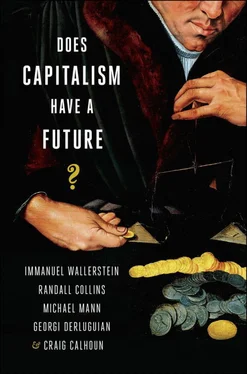Immanuel Wallerstein - Does Capitalism Have a Future?
Здесь есть возможность читать онлайн «Immanuel Wallerstein - Does Capitalism Have a Future?» весь текст электронной книги совершенно бесплатно (целиком полную версию без сокращений). В некоторых случаях можно слушать аудио, скачать через торрент в формате fb2 и присутствует краткое содержание. Город: New York, Год выпуска: 2013, ISBN: 2013, Издательство: Oxford University Press, Жанр: Публицистика, sci_economy, на английском языке. Описание произведения, (предисловие) а так же отзывы посетителей доступны на портале библиотеки ЛибКат.
- Название:Does Capitalism Have a Future?
- Автор:
- Издательство:Oxford University Press
- Жанр:
- Год:2013
- Город:New York
- ISBN:978-0-19-933084-3
- Рейтинг книги:5 / 5. Голосов: 1
-
Избранное:Добавить в избранное
- Отзывы:
-
Ваша оценка:
- 100
- 1
- 2
- 3
- 4
- 5
Does Capitalism Have a Future?: краткое содержание, описание и аннотация
Предлагаем к чтению аннотацию, описание, краткое содержание или предисловие (зависит от того, что написал сам автор книги «Does Capitalism Have a Future?»). Если вы не нашли необходимую информацию о книге — напишите в комментариях, мы постараемся отыскать её.
Does Capitalism Have a Future? — читать онлайн бесплатно полную книгу (весь текст) целиком
Ниже представлен текст книги, разбитый по страницам. Система сохранения места последней прочитанной страницы, позволяет с удобством читать онлайн бесплатно книгу «Does Capitalism Have a Future?», без необходимости каждый раз заново искать на чём Вы остановились. Поставьте закладку, и сможете в любой момент перейти на страницу, на которой закончили чтение.
Интервал:
Закладка:
We find hope against doom exactly in the degree to which our future is politically underdetermined. Systemic crisis loosens and shatters the structural constraints that are themselves the inheritance of past dilemmas and the institutional decisions of prior generations. Business as usual becomes untenable and divergent pathways emerge at such historical junctures. Capitalism, along with its creative destruction of older technologies and forms of production, has also been a source of inequality and environmental degradation. Deep capitalist crisis may be an opportunity to reorganize the planetary affairs of humanity in a way that promotes more social justice and a more livable planet.
Our big contention is that historical systems can have more or less destructive ways of going extinct while morphing into something else. The history of human societies has passed through bursts of revolution, moments of expansive development, and painfully long periods of stagnation or even involution. However unwanted by anybody, the latter remains among the possible outcomes of global crisis in the future. The political and economic structures of present-day capitalism could simply lose their dynamism in the face of rising costs and social pressures. Structurally, this could lead to the world’s fragmentation into defensive, internally oppressive, and xenophobic blocs. Some might see it as the clash of civilizations, others as the realization of an Orwellian “1984” anti-utopia enforced by the newest technologies of electronic surveillance. Ways of reestablishing social order in the midst of extreme conflict might include those reminiscent of fascism, but also the possibility of a much broader democracy. It is what we wanted to stress above all in this book.
In recent decades the prevalent opinion in politics and mainstream social sciences has been that no major structural change is even worth thinking about. Neoclassical economics bases its models on the assumption of a fundamentally unchanging social universe. When crises happen, policy adjustments and technological innovation always bring renewals of capitalism. This is, however, only an empirical generalization. Capitalism’s existence as a system for 500 years does not prove that it will last forever. The cultural-philosophical critics of various postmodernist persuasions who emerged as a countermovement in the 1980s—when the utopian hopes of 1968 had receded into frustration and Soviet communism was visibly in crisis—came to share the same assumption of capitalism’s permanence, although not without a big dose of existential despair. Consequently, the cultural postmodernists left themselves with a dislocation of the will to look structural realities in the face. We will return in our concluding chapter to a more detailed discussion of the present world situation, including its intellectual climate.
We have deliberately written this book in a more accessible style because we intended to open our arguments to wider discussion. The elaboration of our arguments, with all the footnotes, can be found in the monographs that we have written individually. The area where we have done much of our professional research is usually called world-systems analysis or macrohistorical sociology. Macrohistorical sociologists study the origins of capitalism and modern society, as well as the dynamics of ancient empires and civilizations. Seeing social patterns in the longer run, they find that human history moves through multiple contradictions and conflicts, crystallizing over long periods in impermanent configurations of intersecting structures. This is where we had sufficient agreement to author collectively the first and the last chapters bracketing this book. But we also have our particular theories and areas of expertise, and the resulting opinions are reflected in the individual chapters. This short book is not a manifesto sung in one voice. It is a debate of equals arguing on the basis of our knowledge about the past and present of human societies. It is therefore an invitation to ask seriously and openly what could be the next big turn in world history.
In the end, are we prophesying some kind of socialism? The reasoned answer, rather than a futile polemic deriving from ideological faith, must have two parts. First, it is not prophecy because we insist on abiding by the rules of scientific analysis. Here this means showing with reasonable exactness why things may change and how we get from one historical situation to another. Will the end destination be socialism? Our lines of reasoning extend into the middle-range future of the next several decades. Randall Collins asks: what could possibly avert the looming destitution of middle classes whose roles in for-profit market organization become technologically redundant? It could take the form of a socialist reorganization of production and distribution—that is, a political economy in a conscious and collectively coordinated manner designed to make the majority of people relevant. It is thus the structural extension of the problems of advanced capitalism that render socialism the most likely candidate for replacing capitalism. But the lessons of 20th century experience with communist and social democratic states are not forgotten. Socialism had its own problems, mainly from an organizational hypercentralization that provided ample opportunities for political despotism, and the loss of economic dynamism over time. Even if the crisis of capitalism is solved along socialist lines, the problems of socialism will come back into the center of attention. Venturing even further into the long-term future, Collins suggests that socialism itself will not last forever, and the world will oscillate between various forms of capitalism and socialism as each founders on its own shortcomings.
In differently optimistic projections, Craig Calhoun and Michael Mann see the possibility of an alliance of national states uniting in the face of ecological and nuclear disasters. This, they argue, can ensure the continued vitality of capitalism in a more benign social democratic version of globalization. Whatever might come after capitalism, Georgi Derluguian argues that it would never resemble the communist pattern. Fortunately, the historical conditions for the Soviet-style “fortress socialism” are gone, along with the geopolitical and ideological confrontations of the last century. Immanuel Wallerstein, however, considers it intrinsically impossible to tell what might be replacing capitalism. The alternatives are either a noncapitalist system that would nonetheless continue the hierarchical and polarizing features of capitalism, or a relatively democratic and a relatively egalitarian system. Possibly several world-systems will emerge from the transition. Calhoun also argues that more loosely coupled systems may develop to deal with disruptions from external threats as well as the internal risks of capitalism. This runs against the widely shared assumption that the world has become irreversibly global. Yet, once again, what theory supports this ideological contention?
The twentieth century thinkers and political leaders of all persuasions proved to be wrong in their ideological conviction that there was a single road to the future, as passionate advocates of capitalism, communism, and fascism argued and attempted to impose. None of us subscribes to the utopian view that human will can make anything possible. Yet it is demonstrable that our societies can be put together in a certain variety of ways. The result significantly depends on the political visions and wills that prevail in the wake of major crises that produce history’s founding moments. Such moments in the past often meant political collapses and revolutions. All five of us, however, strongly doubt that the past revolutions occurring within separate states and often with considerable violence anticipate the future politics of capitalist crisis at the global level. This realization gives us hope that things can be done better in the future.
Читать дальшеИнтервал:
Закладка:
Похожие книги на «Does Capitalism Have a Future?»
Представляем Вашему вниманию похожие книги на «Does Capitalism Have a Future?» списком для выбора. Мы отобрали схожую по названию и смыслу литературу в надежде предоставить читателям больше вариантов отыскать новые, интересные, ещё непрочитанные произведения.
Обсуждение, отзывы о книге «Does Capitalism Have a Future?» и просто собственные мнения читателей. Оставьте ваши комментарии, напишите, что Вы думаете о произведении, его смысле или главных героях. Укажите что конкретно понравилось, а что нет, и почему Вы так считаете.












